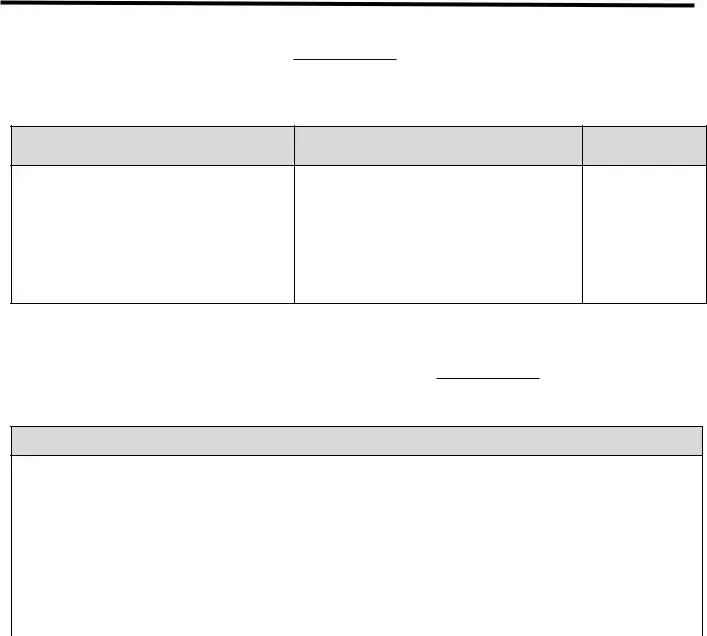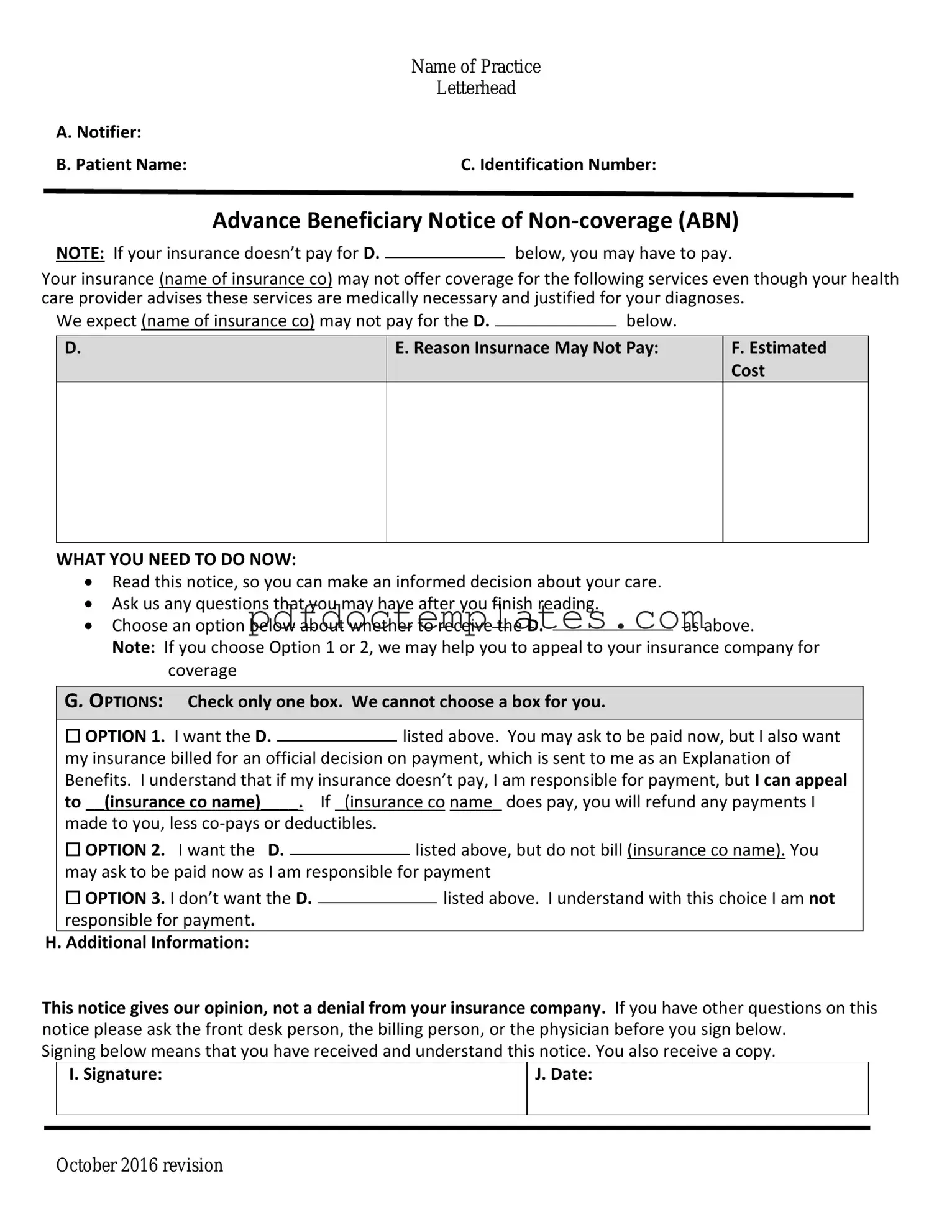Download Advance Beneficiary Notice of Non-coverage Template
Misconceptions
The Advance Beneficiary Notice of Non-coverage (ABN) form is often misunderstood, leading to confusion among beneficiaries and healthcare providers alike. Below are six common misconceptions about the ABN, along with clarifications to help demystify its purpose and use.
- Misconception 1: The ABN is only for Medicare beneficiaries.
- Misconception 2: Signing an ABN means the patient must pay for services.
- Misconception 3: The ABN is a guarantee of payment for services.
- Misconception 4: Providers must always issue an ABN before providing services.
- Misconception 5: The ABN form is the same as a waiver of liability.
- Misconception 6: Patients should never sign an ABN.
This is incorrect. While the ABN is primarily associated with Medicare, it can also be used in situations involving other insurance plans that follow similar guidelines regarding non-coverage.
Not necessarily. Signing an ABN indicates that the patient understands that the service may not be covered by Medicare, but it does not obligate them to pay. The patient can still appeal the decision if they believe the service should be covered.
This is misleading. An ABN does not guarantee payment. It simply informs beneficiaries that the service may not be covered, allowing them to make informed decisions about their care.
This is not accurate. An ABN is only required when a provider believes that a service may not be covered by Medicare. If coverage is expected, there is no need for an ABN.
This is a common confusion. While both documents inform patients about potential non-coverage, the ABN specifically addresses Medicare coverage issues, whereas a waiver of liability is more general and can apply to various situations.
This is an oversimplification. Patients should carefully consider the implications of signing an ABN, but it can be beneficial in certain situations. It provides clarity regarding potential costs and coverage, allowing patients to make informed choices about their healthcare.
File Details
| Fact Name | Details |
|---|---|
| Purpose | The Advance Beneficiary Notice of Non-coverage (ABN) informs Medicare beneficiaries that a service or item may not be covered by Medicare. |
| Beneficiary Rights | Beneficiaries have the right to refuse services after receiving the ABN, understanding that they may be responsible for payment. |
| State-Specific Regulations | Some states may have additional requirements for the ABN under state law, such as California's Health and Safety Code Section 1367.5. |
| Delivery Method | The ABN must be delivered to the beneficiary in person or via mail before the service is provided, ensuring clear communication. |
Key takeaways
The Advance Beneficiary Notice of Non-coverage (ABN) form is an important tool for Medicare beneficiaries. Here are some key takeaways to consider when filling out and using this form:
- The ABN informs beneficiaries that a service may not be covered by Medicare.
- It allows patients to make informed decisions about their healthcare and potential out-of-pocket costs.
- Providers must explain the reason for non-coverage and provide the ABN before the service is rendered.
- Beneficiaries should keep a copy of the signed ABN for their records.
- Using the ABN correctly can help avoid billing disputes between providers and beneficiaries.
Dos and Don'ts
When filling out the Advance Beneficiary Notice of Non-coverage form, it is important to be careful and thorough. Here are some things to keep in mind:
- Do read the entire form carefully before starting.
- Don't leave any sections blank unless instructed to do so.
- Do provide accurate information about your medical services.
- Don't sign the form until you fully understand its contents.
- Do ask questions if you are unsure about any part of the form.
- Don't rush through the process; take your time to ensure accuracy.
- Do keep a copy of the completed form for your records.
Common mistakes
-
Failing to Read the Instructions Carefully: Many individuals rush through the form without fully understanding the guidelines. This can lead to incomplete or incorrect information being provided.
-
Not Providing Accurate Patient Information: It's crucial to ensure that the patient's name, Medicare number, and other personal details are correct. Mistakes in this section can delay processing or result in denial of coverage.
-
Ignoring the Explanation of Benefits: Some people overlook the section that explains why a service may not be covered. Understanding these reasons can help in making informed decisions about future care.
-
Overlooking Signature Requirements: A common error is neglecting to sign and date the form. This step is essential for validating the notice and ensuring it is legally binding.
-
Not Keeping a Copy: After submitting the form, failing to retain a copy for personal records can be a costly mistake. Having documentation can be vital if disputes arise regarding coverage decisions.
What You Should Know About This Form
-
What is the Advance Beneficiary Notice of Non-coverage (ABN)?
The Advance Beneficiary Notice of Non-coverage (ABN) is a form used by healthcare providers to inform Medicare beneficiaries that a service or item may not be covered by Medicare. This notice helps beneficiaries understand their potential financial responsibility before receiving the service.
-
When should I receive an ABN?
You should receive an ABN when a healthcare provider believes that Medicare may not pay for a specific service or item. This typically occurs before the service is provided, allowing you to make an informed decision about whether to proceed. If you do not receive an ABN and Medicare does not cover the service, you may be able to appeal the decision.
-
What should I do if I receive an ABN?
If you receive an ABN, read it carefully. It will explain the service in question, why it may not be covered, and your options. You can choose to accept the service and agree to pay out-of-pocket if it is not covered, or you can decline the service. Make sure to keep a copy of the ABN for your records.
-
What happens if I don't sign the ABN?
If you choose not to sign the ABN, the provider may not provide the service. In some cases, the provider may still perform the service, but you will be responsible for the payment if Medicare denies coverage. It is important to understand your options and the potential costs before making a decision.
Advance Beneficiary Notice of Non-coverage Example

|
Name of Practice |
|
Letterhead |
A. Notifier: |
|
B. Patient Name: |
C. Identification Number: |
Advance Beneficiary Notice of
NOTE: If your insurance doesn’t pay for D.below, you may have to pay.
Your insurance (name of insurance co) may not offer coverage for the following services even though your health care provider advises these services are medically necessary and justified for your diagnoses.
We expect (name of insurance co) may not pay for the D. |
|
below. |
|
D.
E. Reason Insurnace May Not Pay:
F.Estimated Cost
WHAT YOU NEED TO DO NOW:
Read this notice, so you can make an informed decision about your care.
Ask us any questions that you may have after you finish reading.
Choose an option below about whether to receive the D.as above.
Note: If you choose Option 1 or 2, we may help you to appeal to your insurance company for coverage
G. OPTIONS: Check only one box. We cannot choose a box for you.
|
☐ OPTION 1. I want the D. |
|
listed above. You may ask to be paid now, but I also want |
||||
|
|
||||||
|
my insurance billed for an official decision on payment, which is sent to me as an Explanation of |
||||||
|
Benefits. I understand that if my insurance doesn’t pay, I am responsible for payment, but I can appeal |
||||||
|
to __(insurance co name)____. If _(insurance co name_ does pay, you will refund any payments I |
||||||
|
made to you, less |
|
|
|
|||
|
☐ OPTION 2. I want the D. |
|
|
listed above, but do not bill (insurance co name). You |
|||
|
|
|
|||||
|
may ask to be paid now as I am responsible for payment |
||||||
|
☐ OPTION 3. I don’t want the D. |
|
|
|
listed above. I understand with this choice I am not |
||
|
|
|
|
||||
|
responsible for payment. |
|
|
|
|||
H. Additional Information: |
|
|
|
||||
This notice gives our opinion, not a denial from your insurance company. If you have other questions on this notice please ask the front desk person, the billing person, or the physician before you sign below.
Signing below means that you have received and understand this notice. You also receive a copy.
|
I. Signature: |
J. Date: |
|
|
|
|
|
|
October 2016 revision
Consider More Forms
Fillable Bill of Lading - This document is crucial for tracking the shipment and ensuring delivery to the correct person.
Dmv Odometer Disclosure Statement - The seller’s signature on this form acknowledges the odometer reading.
For those looking to ensure a smooth transaction, the essential Florida bill of sale may serve as a crucial tool in documenting personal property transfers accurately. To get started, you can explore this helpful resource: essential Florida bill of sale form.
Can You Skip a Month With Melaleuca - Provide any other reasons for your decision in the space provided.
